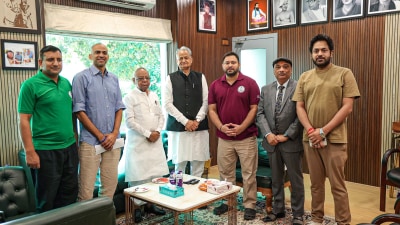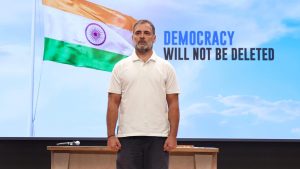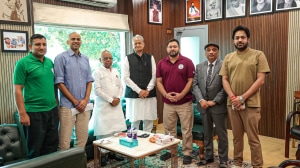Nukes: Iran told to face the Iraq test
A last-minute compromise between the developing and Western world at the International Atomic Energy Agency (IAEA) in Vienna this evening al...

A last-minute compromise between the developing and Western world at the International Atomic Energy Agency (IAEA) in Vienna this evening allowed the passage of a unanimous resolution demanding that Iran meet an October 31 deadline to prove it was not pursuing a secret nuclear weapons programme.
Iran’s ambassador to the IAEA Akbar Salehi walked out of the closed-door meeting before the resolution was passed. Threatening a ‘‘deep review’’ of Iran’s relations with the IAEA, he accused Washington of seeking to bring about an Iraq-type invasion of Iran.
India joined the 35-member board in passing the toughly-worded resolution, but not before the 15-member NAM group within the board, led by Malaysia, made it clear that the resolution-without-a-vote was open to differing interpretations by various countries.
This move saved India from taking a clear stand on old friend Iran’s nuclear programme. New Delhi did not want to be seen abandoning Teheran in its time of trouble, even if it privately believed that the contaminated uranium found in Iran’s Natanz reactor was not purely innocent. The problem was it did not want to be seen as demonising Iran like the rest of the Western bloc.
Thursday’s draft resolution sponsored by Canada, Australia and Japan would have carried the day since the Western bloc is much larger than that of the developing world. But these nations are said to have backed off today when it saw that the mood in the IAEA was to give Iran ‘‘one final chance.’’
Iranian observers here pointed out that ironically, the IAEA discussions would exacerbate the power struggle within Iran, with the conservatives pushing the reformist group into a corner and accusing them of not being able to appropriately defend their country abroad.
Reuters adds from Vienna: US ambassador Kenneth Brill warned that any decision by Iran to suspend the IAEA inspection process would be interpreted as an admission that they were pursuing atomic weapons.
‘‘If they wish to disrupt that (inspection) process, it can only lead the board and indeed the international community to conclude that in fact they are not pursuing a peaceful programme,’’ Brill told reporters.
In Washington, a US official said: ‘‘This time we hope there’s not going to be a way to escape because this resolution is really tightening the noose on them.’’
If Iran does not cooperate and is officially declared in non-compliance, ‘‘Iran will forfeit its right to share nuclear technology for peaceful purposes’’ and Russia will not be able to provide critical nuclear fuel for Iran’s Bushehr nuclear plant, the official said.
In Moscow, a senior Russian official, speaking on condition of anonymity, said that ‘‘both Russia and the IAEA support this new resolution on Iran.’’
‘‘But of course, this resolution does not mean the end of talks with Iran,’’ he added.
Diplomats said Russia’s delegation had fiercely opposed the tough resolution during the long negotiations on the wording of the text due to fears that siding with the US would jeopardise billions of dollars of nuclear deals with Teheran.
IAEA chief Mohamed ElBaradei told reporters he hoped Iran would not end cooperation with the agency but increase it.
He said the resolution sent ‘‘a very powerful message to Iran that they need to cooperate fully and immediately and to show complete transparency.’’ Inspectors would be heading to Iran within the next few weeks to answer their many outstanding questions about Teheran’s nuclear programme, ElBaradei said.






- 01
- 02
- 03
- 04
- 05

























